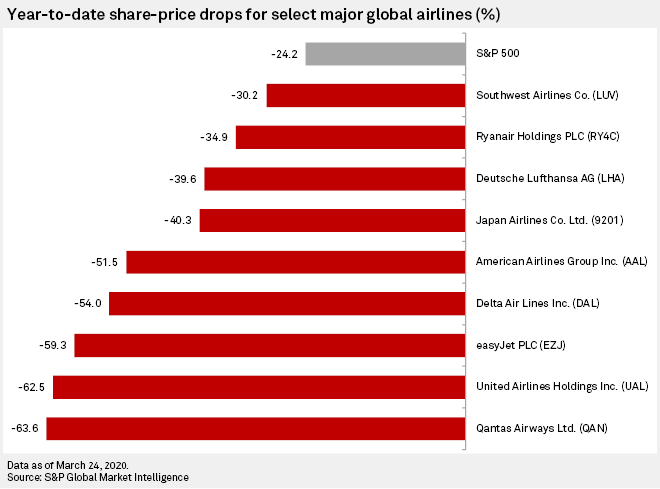With fleets grounded, airports deserted and would-be travelers ordered not to leave their homes, the global aviation industry could require billions of dollars of government cash to secure its future.
Air traffic had approximately halved in Western Europe by March 19, according to the International Air Transport Association, or IATA. CEO Alexandre de Juniac said March 24 that demand for air travel could fall 38% year over year in 2020 if lockdowns persist for three months, equating to $252 billion in lost revenue.
As airlines around the world were withdrawing earnings guidance, putting staff on leave and announcing layoffs, Deutsche Lufthansa AG's CEO Carsten Spohr on March 19 told analysts that the aviation industry would emerge "smaller" in the aftermath of the crisis. Executives at American Airlines Group Inc. and Delta Air Lines Inc. said they were already considering early retirement of older, less-efficient aircraft.

"The lesson we all learned in 2009 is that while the demand drop is sharp, so will be likely the recovery. That being said, we are taking a conservative view of how the situation will evolve," Delta CEO Edward Bastian told analysts March 10.
"We expect demand erosion will continue in the near term. ... Besides the safety of our employees and customers, our overarching goal during this time is cash preservation."
Many other airlines are likely to be much more vulnerable and, as the U.K. government indicated on March 24, help is not universally assured. U.K. Chancellor Rishi Sunak said in a letter seen by a number of media outlets that bailouts would only be considered case by case and after airlines had exhausted all other potential sources of funding.
S&P Global Ratings has downgraded credit ratings on a swath of airlines including Lufthansa, International Consolidated Airlines Group SA, Ryanair Holdings PLC and easyJet PLC, citing uncertainty over the duration of the impact and the likelihood of deteriorating liquidity. The rating agency on March 24 downgraded Delta from BBB- to BB, placing it in "junk" territory.
"There are many airlines that are strategically important at a national level in terms of providing critical connectivity," said Moody's analyst Martin Hallmark. "They are capable of being strong candidates for government support."
"I think governments are wrestling with the concept of blanket support for the industry and those companies that have weaker balance sheets and may not survive. I don't think the government wants to pick winners and losers but to have market forces do that," Hallmark said.
The new coronavirus's spread to Europe and beyond sounded the death knell for British airline Flybe on March 5 as investors gave up hope of turning around the ailing short-haul carrier with the prospect of revenue slowing to a trickle. Many more could face the same fate, the industry has warned.
While airline executives have acknowledged that there will be savings from the plunge in the price of oil, that will offer scant comfort at a time when many airlines have never needed less of the commodity.
Some operators, including Ryanair, could now count delays in the delivery of the stricken Boeing 737 MAX planes as a blessing. Each undelivered aircraft is one less idled asset on their books and one less parking space to find, according to U.K.-based aviation consultant John Strickland.
Beyond the collapse in traffic and revenue, airlines will have to deal with the practicalities of grounding hundreds of billions of dollars of assets, such as the sealing and periodic turnover of engines and corrosion checks.
"An airline in what you could call a hibernation state is still costing money to be hibernated. Cost is going out, while no revenue is coming in," Strickland said.
Airlines will also need to plan for how they would maintain pilots' "recency," he said, rules that in the U.K., for one, oblige pilots to conduct at least three landings every 90 days, either in the air or in a simulator. One British Airways captain tweeted that crew simulator training would imply ignoring social distancing recommendations.
The challenges go beyond the cockpit. Air traffic control centers at 11 U.S. airports closed temporarily after some staff tested positive for coronavirus, forcing pilots to communicate directly with each other to coordinate spacing for landing and take-off, Business Insider reported March 23.
On the manufacturing side of the industry, Airbus SE has withdrawn its €1.4 billion dividend and top-up pension funding for 2019 and secured a €15 billion credit facility. It is considering reducing numbers of temporary workers and has withdrawn its 2020 guidance, Guillaume Faury said March 23.
The company could be forced to seek state aid, Reuters reported, citing anonymous sources familiar with the matter. Its rival Boeing Co. has called for the U.S. government to make $60 billion available to the aerospace industry.
"We can't get our heads around the magnitude of this," said Strickland. "It's not remotely comparable to 9/11 or the Iceland volcano or the financial crisis. It is like all of them and more."



